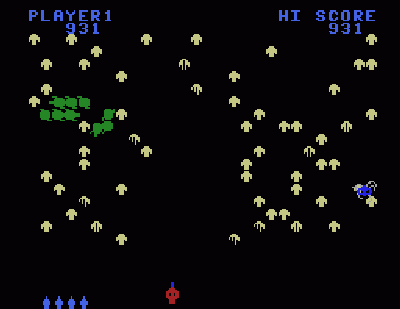Meet Dona Bailey, The Woman Behind Atari’s Centipede
This Exists... Because of A Lady

If you remember hanging out at arcades as a kid, and blowing all of the quarters in your piggy bank every weekend, you definitely know about Centipede. The classic arcade game was bright, colorful, operated by a trackball, and difficult as hell: players must shoot a centipede that splits into more centipedes as it winds down the screen. But what you might not know, is that a large part of the iconic shoot ’em up game was designed by Dona Bailey, one of the few women programmers for the Atari.
Dona Bailey fell in love with video games by way of the Pretenders. Specifically, when a friend found out that she loved their song “Space Invaders” so much, he took her to a bar that had the Atari game of the same name. She popped a quarter in, lost all of her lives almost instantaneously, and immediately became intrigued by gaming. It was 1980, and she was working as a computer programmer for General Motors. When she found out that Atari, the video game company famous for its smash-hit Pong, was using the same Motorola processor to program games that she was using at a GM plant, it didn’t take her long to jump ship. She joined Atari in 1980 as the only female programmer in its arcade division.
It wasn’t always easy being the only woman in an all-male work culture: “It was interesting to see how a male society functioned,” she says. “It was kind of rough sometimes, too. It was a culture that I don’t think they were thinking ‘there is one woman, we should modify our behavior for her sake’ … I grew a thicker skin.”
In some ways, Centipede may have been born out of Bailey’s interest in a game unlike those being worked on by the majority of her male coworkers at Atari — she recalls they had a notebook filled with ideas for 30 game projects, one of which involved “a multi-segmented insect that walks out on the screen and winds its way down toward the player.” She elected to work on that one, since it was the only one that wasn’t “violent” — after all, she reasoned: it’s not so bad to kill bugs.
Of the four people assigned to develop the game, she took the role of software engineer. She recalls that, unlike today, there were no books, or previous game developers serving as mentors, “no place to go when you needed help,” she says. Centipede came out in 1981. She worked on one other game that never came out — processors were limited at the time, and she couldn’t make the game exactly how she wanted to. She left Atari two years later at 26, and today she teaches rhetoric and writing at the University of Arkansas at Little Rock.
This year is Atari’s 40th anniversary, but to Bailey it seems like just yesterday she was programming one of arcade gamers’ most beloved titles : “I hadn’t realized that it was 40 years,” she says. “Centipede came out 31 years ago, which seems long enough. ’40 years of fun’ is the greatest slogan, but it made me gasp.”
When Bailey left Atari, she was the only woman in the arcade division, and one of the few in the entire company. Not all that much has changed: according to the New York Times, women receive fewer than a fifth of the bachelor’s degrees awarded in computer science, even though they get nearly 60 percent of all bachelor’s degrees, according to the National Science Foundation. Although Bailey was a key developer of one of the most popular arcade games of all time, she fell into video game obscurity until a decade ago, when she had a few interviews and her students added her to Wikipedia. Although it is still troublesome that so few women enter computer science careers, and even less enter the gaming industry, perhaps honoring the women who do, women like Dona Bailey, is the first of the many steps it will take to inspire more girls to pursue video game programming in spite of a work culture often rough and unwelcoming.
(via Geek Feminism.)
Have a tip we should know? [email protected]